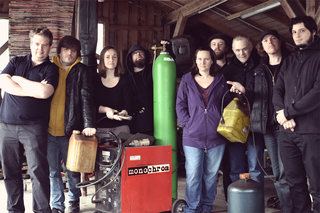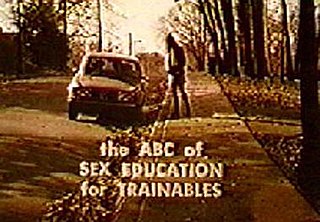Related Research Articles

A hippie, also spelled hippy, especially in British English, is someone associated with the counterculture of the 1960s, originally a youth movement that began in the United States during or around 1964 and spread to different countries around the world. The word hippie came from hipster and was used to describe beatniks who moved into New York City's Greenwich Village, San Francisco's Haight-Ashbury district, and Chicago's Old Town community. The term hippie was used in print by San Francisco writer Michael Fallon, helping popularize use of the term in the media, although the tag was seen elsewhere earlier.

Gerald McBoing-Boing is an animated short film about a little boy who speaks through sound effects instead of spoken words. It was produced by United Productions of America (UPA) and given wide release by Columbia Pictures on November 2, 1950. It was adapted by Phil Eastman and Bill Scott from a story by Dr. Seuss, directed by Robert Cannon, and produced by John Hubley.

United Productions of America, better known as UPA, was an American animation studio and later distribution company founded in 1941 as Industrial Film and Poster Service by former Walt Disney Productions employees. Beginning with industrial and World War II training films, UPA eventually produced theatrical shorts for Columbia Pictures such as the Mr. Magoo series. In 1956, UPA produced a television series for CBS, The Boing-Boing Show, hosted by Gerald McBoing Boing. In the 1960s, UPA produced syndicated Mr. Magoo and Dick Tracy television series and other series and specials, including Mister Magoo's Christmas Carol. UPA also produced two animated features, 1001 Arabian Nights and Gay Purr-ee, and distributed Japanese films from Toho Studios in the 1970s and 1980s.
Laura Kightlinger is an American actress and writer. She was a writer and consulting producer on Will & Grace, while also occasionally appearing on the show as the character Nurse Sheila. She was also a writer on the CBS series 2 Broke Girls. Kightlinger also played the title role in the TV show The Minor Accomplishments of Jackie Woodman, which she created, wrote, and executive produced. Since 2019, she has appeared in critically acclaimed television series, including PEN15, and Curb Your Enthusiasm appearing alongside Larry David, Albert Brooks, and Lucy Liu.

Bill Plympton is an American animator, graphic designer, cartoonist, and filmmaker best known for his 1987 Academy Award–nominated animated short Your Face and his series of shorts featuring a dog character starting with 2004's Guard Dog.

The Trip is a 1967 American psychedelic film released by American International Pictures, directed by Roger Corman and written by Jack Nicholson. It was shot on location in and around Los Angeles, including on top of Kirkwood in Laurel Canyon, the Hollywood Hills, and near Big Sur, California, over three weeks in March and April 1967. Peter Fonda stars as a young man who experiences his first LSD trip.

Monochrom is an international art-technology-philosophy group, publishing house and film production company. It was founded in 1993, and defines itself as "an unpeculiar mixture of proto-aesthetic fringe work, pop attitude, subcultural science and political activism". Its main office is located at Museumsquartier/Vienna.
The Psychedelic era was the time of social, musical and artistic change influenced by psychedelic drugs, occurring from the mid-1960s to the mid-1970s. The era was defined by the proliferation of LSD and its following influence in the development of psychedelic music and psychedelic film in the Western world.

Wonder Showzen is an American adult puppet black comedy television series that aired between 2005 and 2006 on MTV2. It was created by Vernon Chatman and John Lee of PFFR.

"Lisa the Vegetarian" is the fifth episode of the seventh season of the American animated television series The Simpsons. It originally aired on Fox in the United States on October 15, 1995. In the episode, Lisa decides to stop eating meat after bonding with a lamb at a petting zoo. Her schoolmates and family members ridicule her for her beliefs, but with the help of Apu as well as Paul and Linda McCartney, she commits to vegetarianism.
The Brotherhood of Eternal Love was an organization of drug users and distributors that operated from the mid-1960s through the late 1970s in Orange County, California. They were dubbed the Hippie Mafia by the police. They produced and distributed drugs in hopes of starting a "psychedelic revolution" in the United States.

The ABC of Sex Education for Trainables is a 1975 short educational film hosted by Richard Dix. It was intended to inform people about the need to educate the mentally disabled about sex and sexuality. Reflecting the views held at the time, the film explains that "trainables" cannot learn in the same manner as those of normal intelligence, but must instead be trained through repetition.

The Pink Panther is a fictional animated character who appears in the opening and/or closing credit sequences of every film in The Pink Panther series except for A Shot in the Dark and Inspector Clouseau. In the storyline of the original film, the "Pink Panther" is the name of a valuable pink diamond named for a flaw that shows a "figure of a springing panther" when held up to the light in a certain way; in the credits this was translated to an animated pink panther. Only the first Pink Panther film and its third sequel, The Return of the Pink Panther, featured the diamond.
Diane Linkletter was the daughter and youngest child of popular American media personality Art Linkletter and his wife, Lois Foerster. In 1969, she died by suicide at the age of 20.

The counterculture of the 1960s was an anti-establishment cultural phenomenon and political movement that developed in the Western world during the mid-20th century. It began in the early 1960s, and continued through the early 1970s. It is often synonymous with cultural liberalism and with the various social changes of the decade. The effects of the movement have been ongoing to the present day. The aggregate movement gained momentum as the civil rights movement in the United States had made significant progress, such as the Voting Rights Act of 1965, and with the intensification of the Vietnam War that same year, it became revolutionary to some. As the movement progressed, widespread social tensions also developed concerning other issues, and tended to flow along generational lines regarding respect for the individual, human sexuality, women's rights, traditional modes of authority, rights of people of color, end of racial segregation, experimentation with psychoactive drugs, and differing interpretations of the American Dream. Many key movements related to these issues were born or advanced within the counterculture of the 1960s.
Toy Porno is a self-released experimental art film by The Frogs. The amateur videotape was compiled in October 1993, as a gift for Kurt Cobain. It would soon become frequent viewing material on the Nirvana tour bus, and later on the Foo Fighters tour bus as well. Later, after generated copies began circulating amongst fans, the band began selling copies at shows. The tape is only available in VHS format. The band plans to release a DVD version but want to digitally re-create the compilation from the original masters and need time and funds to do so. The file is available for download online in AVI format through various outlets.
Hippie exploitation films are late 1960s-early-to-late 1970s exploitation films about the hippie counterculture with situations associated with the movement such as marijuana and LSD use, sex and wild psychedelic parties.
Marijuana is a 34-minute 1968 anti-drug documentary film by Max Miller and distributed by Avanti Films. It is narrated by Sonny Bono. It was described as "the first major film effort to center upon the use and possible risks of marijuana", in which "arguments for and against its use are presented and the accumulation of arguments against is allowed to speak for itself". Music for the documentary was composed by the Byrds' Gene Clark, a "bizarre" choice in his musical career, resulting in "meandering blues and pseudo-psychedelic instrumental jams".
The Mind-Benders is an educational antidrug documentary film concerning hallucinogens produced for the United States Food and Drug Administration in 1967. It "explores the potential therapeutic uses and the known hazards of LSD and other hallucinogens, as well as some of the motivations of abusers". The color 16 mm film was made available from Bureau of Drug Abuse Control field offices and from the FDA National Medical Audiovisual Center. The government's description states that it contains "graphics that suggest a hallucinogenic experience, snippets of interviews with users and doctors, and taped sessions of research with volunteers, the film delves into the destructive as well as possible positive uses of the drug".
References
- 1 2 Manning, Paul (2013), Drugs and Popular Culture in the Age of New Media, Routledge, p. 78, ISBN 9781317974666
- ↑ Case Study LSD (audio commentary) (Art & Trash Miniature 11) - Art & Trash on Vimeo
- ↑ Lockheed's Hilarious Anti-Drug Shorts (1969) - Flashbak
- 1 2 Erickson, Glenn, "DVD Savant review: Sex & Drugs and Social Engineering 101 – The Educational Archives", DVD Talk
- ↑ Frauenfelder, Mark (February 8, 2016), "Unintentionally funny 1969 anti-LSD film by Lockheed Aircraft Corporation", Boing Boing
- ↑ "Your Saturday Nerdout: 1969 Anti-LSD Film Features Screaming Hot Dog Freakout", Wonkette , February 27, 2016[ permanent dead link ]
- ↑ "How One 1969 LSD Scare Film Kickstarted the Vegetarian Craze", Kindland, archived from the original on 2018-01-16, retrieved 2017-06-12